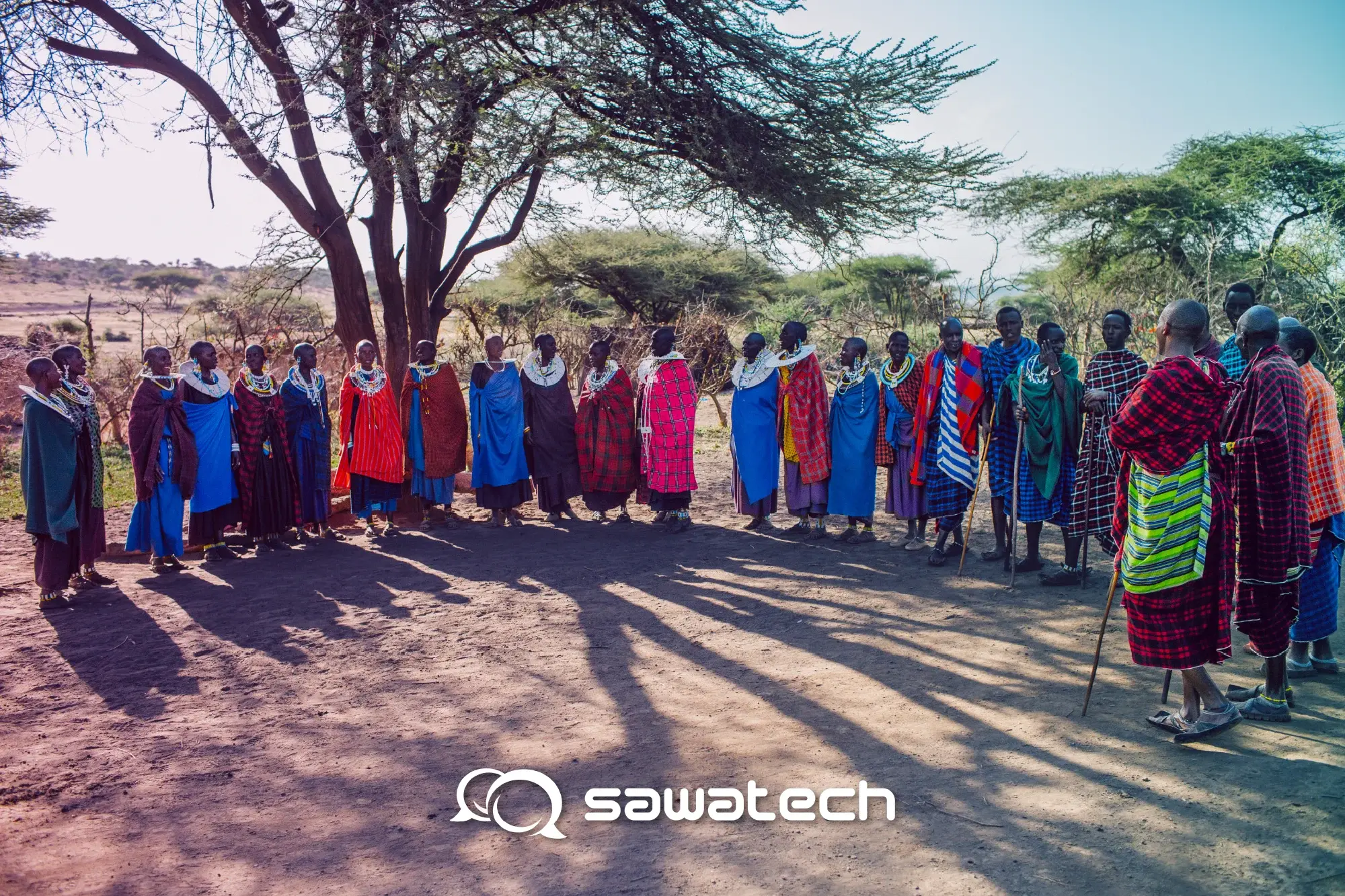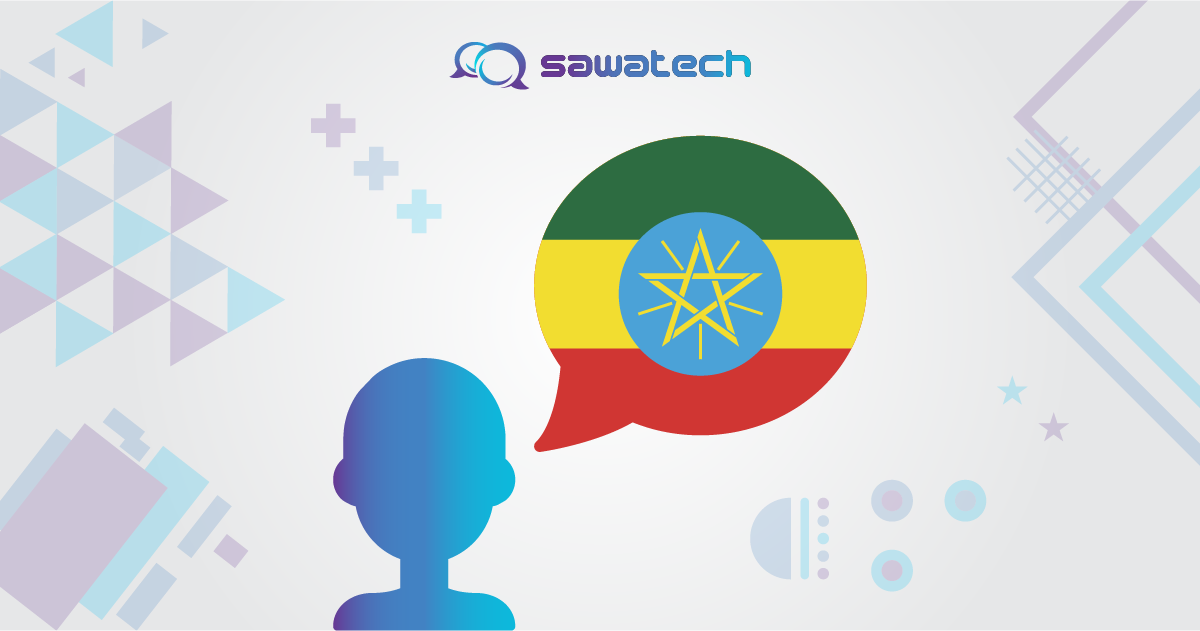Kenya is home to nearly 70 languages that reflect its rich cultural heritage and dynamic social fabric. This remarkable diversity highlights the profound role language plays in shaping daily life and fostering connections across communities.
For businesses seeking success in the Kenyan market, understanding and integrating Kenya’s unique linguistic landscape can open doors to meaningful connections and long-term growth. Continue reading to learn more about the languages spoken in Kenya that make it truly extraordinary.
Official Languages of Kenya: English and Swahili
Swahili and English as official languages play a distinct role in Kenya’s culture and socioeconomic landscape.
Swahili: A national language and Lingua franca
Swahili, or Kiswahili, is a national language that is a major lingua franca across East Africa. Acknowledged as a Bantu language within the Niger-Congo language family, it developed over centuries through interactions between the Bantu-speaking union and Arab trades along the East African coast.
This combination of factors results in Swahili’s rich cultural and linguistic depths. In Kenya, Swahili promotes and fosters communication in trade, education, and governance, bridging gaps between the country’s many ethnic groups. As a unifying force, the language thrives in various domains, including classrooms and national media outlets, reflecting a variety of contexts.
Communities that speak Kenya’s Swahili also exhibit linguistic diversity, with dialects like kiunguja and kimvita adding local flavor to the language. The growing popularity of Sheng demonstrates the language’s adaptability. It is dynamic slang that conjugates Swahili and English, especially among urban youth.
Find the best Swahili translation services to enable your business to grow globally.
English: A Legacy of Colonialism and a Language of Business
People in Kenya have spoken English since the British Colonial era when it was considered the official language of education and administration. English is still the pioneer language of Kenya’s communication infrastructure, especially in government, commerce, education, and tourism.
For businesses, English is vital to target urban areas and educated demographics. Kenyan English, a regional variant incorporating unique expressions, accents, and idioms, gives an additional degree of individuality.

What are the other major regional languages in Kenya?
The country’s linguistic diversity goes far beyond these two; Indigenous languages from different language families, including Bantu, Nilotic, and Cushitic, reflect Kenya’s rich cultural heritage and are integral to the cultural identity of various ethnic groups, shaping traditions and social bonds.
Kikuyu
Spoken by Kenya’s largest ethnic group, the Kikuyu, this Bantu language is predominantly used in the central region. Its tonal nature adds a layer of complexity, but its influence is unmistakable in Kenya’s cultural and economic hubs.
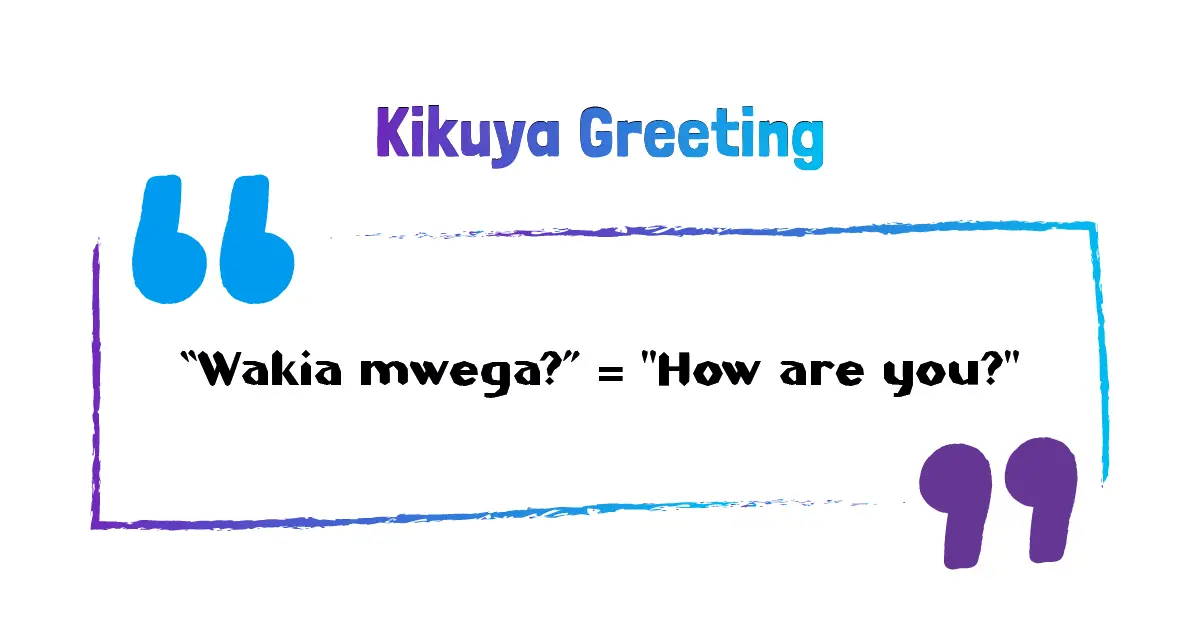
Luhya
Another Bantu language, Luhya, is spoken in western Kenya by the Luhya ethnic group. It features diverse dialects that enrich its linguistic identity.
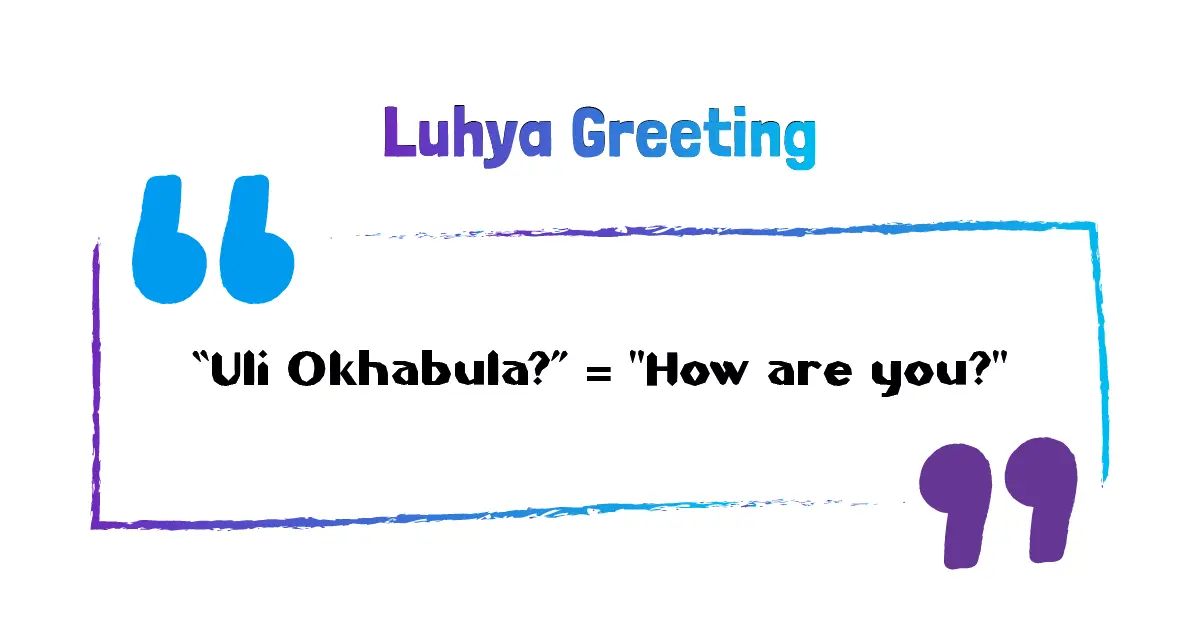
Luo
Luo, a Nilotic language, is widely spoken in western Kenya, particularly around Lake Victoria. As a part of the Nilo-Saharan language family, Luo has a distinct linguistic structure.
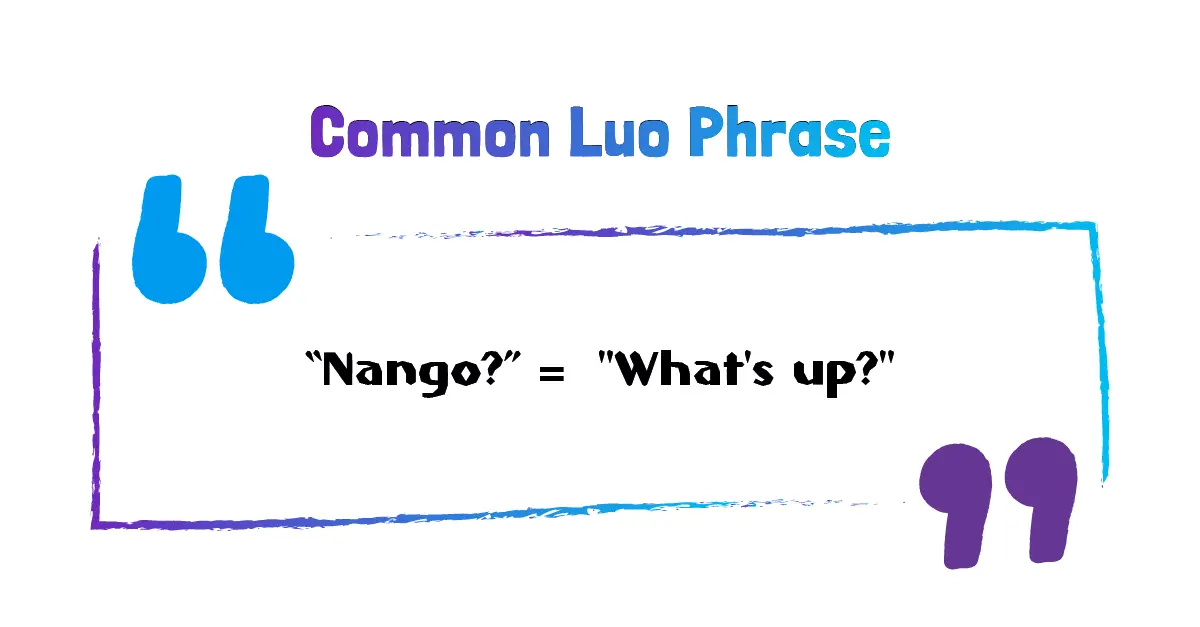
Kalenjin
Another Nilotic language, Kalenjin, is spoken in the Rift Valley region and is integral to the Kalenjin ethnic group’s identity, especially in Kenya’s famed athletics scene.
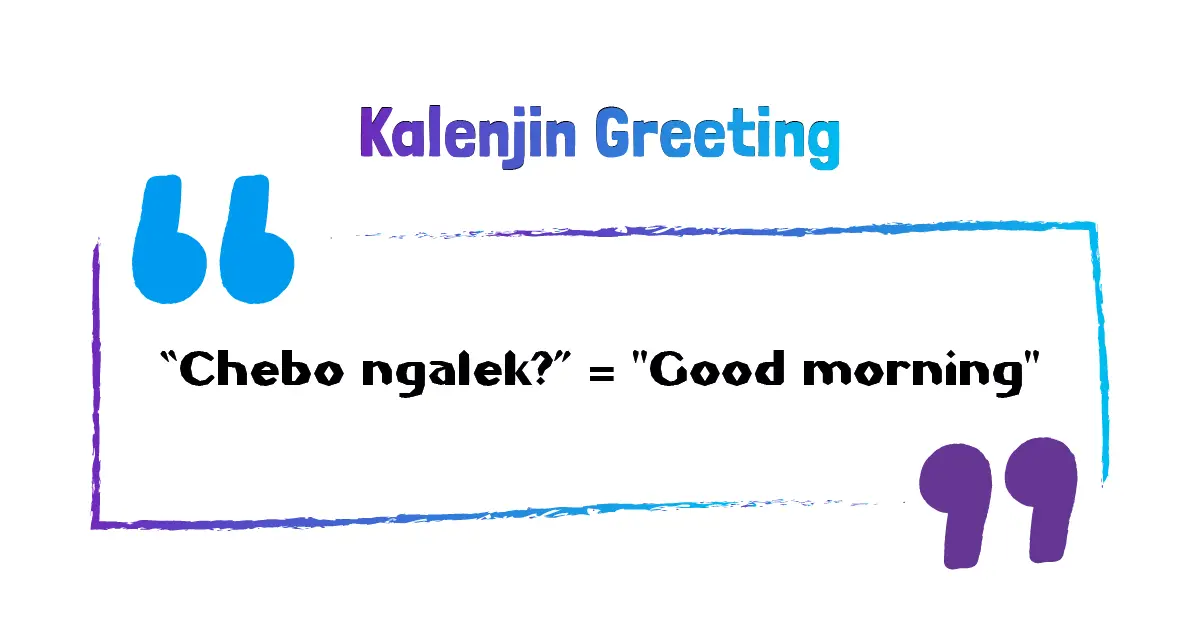
Kamba
Kamba is a Bantu language spoken in southeastern Kenya, known for its melodic cadence and cultural significance.
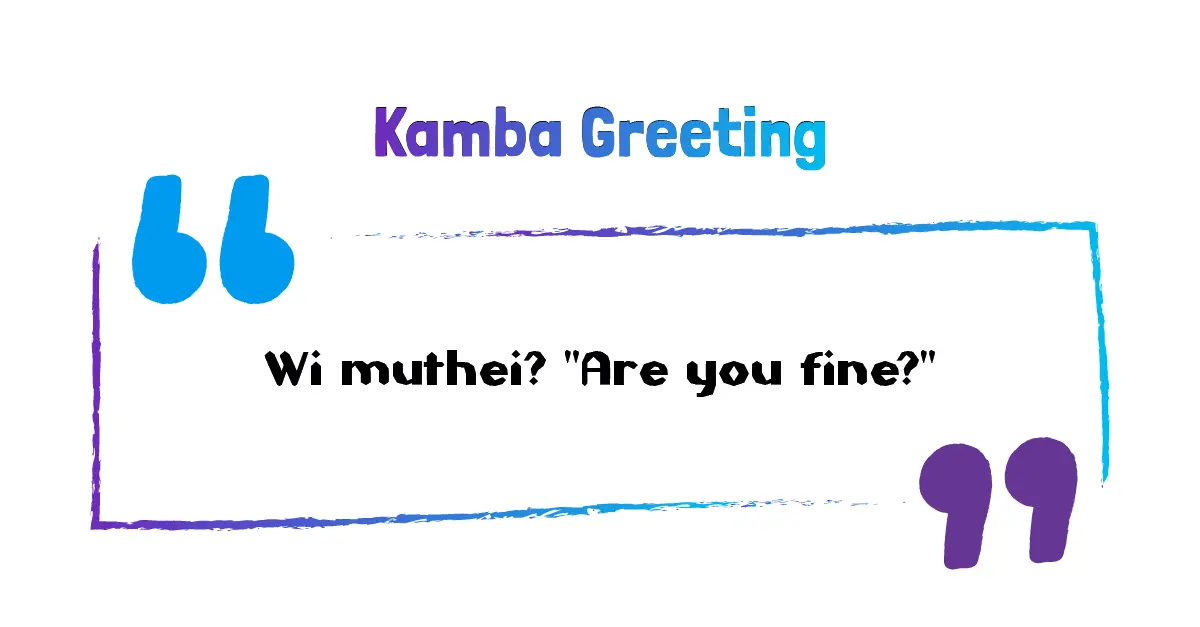
What are other Indigenous Languages?
Additionally, Kenya is home to other important languages. such as Gusii, Meru, Embu, Pokomo, and Turkana, each contributing to the nation’s cultural landscape.
Other Languages: Afro-Asian and Indo-European Influences
Afro-Asiatic Languages
- Somali: Mostly used by the Somali people in northeastern Kenya, this language highlights the country’s ties to the Horn of Africa.
- Rendille: The Rendille people of northern Kenya speak a language that is closely related to Somali.
Indo-European Languages
- Hindi: Hindi reflects the deep historical ties between Kenya and the Indian subcontinent.
- Arabic: Besides its impact on Swahili, Arabic is spoken by a small population, particularly in coastal areas.
English as a Mother Tongue
A small but notable percentage of Kenyans speak English as their first language, as it serves as a second or third language. Its use as a mother tongue is rare.
What is the importance of language selection and localization for the Kenyan market?
Businesses whose localization strategy depends on cultural adaptation can build trust and improve customer loyalty to achieve long-term market success.
Swahili and English might serve urban centers and official communication, but targeting specific regions often requires authentic connections in major local languages like Kikuyu, Luo, or Luhya.
Why should localization go beyond translation?
Just believe in the power of localization and let your business dreams come true. Localization can be the key to long-term success in a diverse market like Kenya. Customizing marketing campaigns involves tailoring content and products to reflect local cultural nuances. Knowing your target persona well will make the localization easier.
Official Languages
- Swahili (Kiswahili): Swahili is the national language and one of the two official languages of Kenya. It is a Bantu language native to East Africa and serves as the lingua franca across the country, widely used in trade, education, and communication between different ethnic groups. Approximately 17 million people in Kenya speak Swahili to some degree, including many as a second language. Swahili has significant Arabic influence due to historical trade connections along the East African coast129.
- English: English is the other official language, inherited from British colonial rule. It is primarily used in government, commerce, education, and legal matters. About 2.7 million Kenyans speak English. Kenyan English is a distinct dialect influenced by local Bantu languages such as Kiswahili and Kikuyu, as well as Nilotic languages and some American English elements1279.
Indigenous Languages
Kenya has about 68 living languages, with 61 being indigenous. These languages belong mainly to three major language families:
- Niger-Congo (Bantu branch): This is the most dominant language family in Kenya, spoken by about 65% of the population. Major Bantu languages include:
- Nilo-Saharan (Nilotic branch): Spoken by about 31% of Kenyans, these languages are common among Nilotic ethnic groups. Prominent Nilotic languages include:
- Afroasiatic (Cushitic and Semitic branches): Spoken by Cushitic-speaking communities and some Arab minorities. Key languages include:
Other Languages
- Indo-European languages: Reflecting historical migration and trade, languages such as Hindi and Punjabi are spoken by small communities, mostly descendants of South Asian immigrants. Hindi speakers number around 6,000 in Kenya28.
- Kenyan Sign Language: Recognized and used by the deaf community in Kenya6.
Language Use and Distribution
- Most Kenyans speak their ethnic mother tongues within their communities.
- Swahili and English act as lingua francas facilitating communication across ethnic lines.
- English is more prevalent in urban, commercial, and educational settings.
- Rural populations tend to be less multilingual, often speaking only their native languages.
- Kenyan English has developed unique features influenced by local languages and culture157.
Summary Table of Language Families and Examples
| Language Family | Examples of Languages | Approximate Speakers | Notes |
|---|---|---|---|
| Niger-Congo (Bantu) | Swahili, Kikuyu, Oluluyia, Kamba, Gusii | Majority (65%) | Swahili is lingua franca; many mother tongues |
| Nilo-Saharan (Nilotic) | Dholuo, Kalenjin, Maasai, Turkana | About 31% | Spoken mainly in western and Rift Valley regions |
| Afroasiatic (Cushitic & Semitic) | Somali, Rendille, Borana, Arabic | Smaller minority | Somali in northeast; Arabic coastal influence |
| Indo-European | English, Hindi, Punjabi | English ~2.7 million; Hindi ~6,000 | English official; Hindi among immigrant communities |
How Can Multilingual Marketing Strategies Help Businesses in Kenya?
Multilingual strategies boost brand loyalty, making customers feel appreciated and understood. Businesses can combine Swahili for national campaigns with Kikuyu or Kalenjin for regional markets, maximizing impact.
Conclusion
Language is the key to building trust and fostering meaningful relationships in this dynamic market, whether connecting with customers through Swahili, the region’s lingua franca, or navigating local communities that speak a unique indigenous tongue.
Kenya is one of the most interesting countries in Africa. Kenya’s linguistic diversity makes both a challenge and an opportunity for businesses. Through understanding the role of official languages, regional dialects, and cultural norms, businesses develop strategies that effectively connect with their target customers.
Take a step to global success with Kenya and contact Sawatech to lead you to achieve your goals.
FAQs About Languages Spoken in Kenya
What are the official languages spoken in Kenya?
Kenya’s official languages are English and Kiswahili (Swahili), as mandated by the 2010 Constitution.
English dominates formal sectors like business, law, and education, while Kiswahili is the national language, widely used for communication and cultural unity.
For businesses entering Kenya, accurate translations in both languages are critical for compliance and customer engagement.
Professional translation ensures your brand resonates in Kenya’s bilingual market.
How many indigenous languages are spoken in Kenya?
Kenya is home to approximately 42 indigenous languages, reflecting its rich ethnic diversity.
These languages belong to three main linguistic families: Bantu (e.g., Kikuyu, Kamba), Nilotic (e.g., Luo, Kalenjin), and Cushitic (e.g., Somali, Borana). The exact number varies slightly due to dialects and ongoing linguistic studies.
What is the role of Kiswahili in Kenyan society?
Kiswahili is Kenya’s national language and a unifying force in its multicultural society.
It’s used in education (primary school instruction), media (radio, TV, newspapers), politics (parliamentary debates), and daily communication, especially in urban and coastal areas. As a lingua franca, Kiswahili bridges ethnic divides and is a symbol of national identity, also playing a key role in East African regional integration.
What are the top ethnic languages in Kenya?
Kikuyu (~22% of the population): Spoken by the Kikuyu, Kenya’s largest ethnic group.
Luhya (~14%): Used by the Luhya community in Western Kenya.
Luo (~13%): Spoken by the Luo in Nyanza and parts of Western Kenya.
Kamba (~11%): Common among the Kamba in Eastern Kenya.
Kalenjin (~12%): Spoken by Kalenjin subgroups like the Nandi and Kipsigis.
How is English used in Kenya’s education and government?
English is Kenya’s official language and the primary medium of instruction in education from primary to university levels, particularly in urban schools and higher education. It’s used for textbooks, exams, and academic communication.
In government, English is the language of official documents, legislation, and high-level administration, ensuring consistency in a multilingual nation. However, Kiswahili and local languages are also used in informal or community-level governance.

